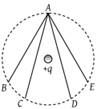Two charged spheres of radii 10 cm and 15 cm are connected by a thin wire. No current will flow, if they have -
1. The same charge on each
2. The same potential
3. The same energy
4. The same field on their surfaces
The electric potential V at any point O (x, y, z all in metres) in space is given by . The electric field at the point in volt/metre is -
1. 8 along negative x-axis
2. 8 along positive x-axis
3. 16 along negative x-axis
4. 16 along positive z-axis
A hollow metal sphere of radius 5 cm is charged so that the potential on its surface is 10 V. The potential at the centre of the sphere is -
1. 0 V
2. 10 V
3. Same as at point 5 cm away from the surface
4. Same as at point 25 cm away from the surface
If a unit positive charge is taken from one point to another over an equipotential surface, then -
1. Work is done on the charge
2. Work is done by the charge
3. Work done is constant
4. No work is done
In the electric field of a point charge q, a certain charge is carried from point A to B, C, D and E. Then the work done

1. Is least along the path AB
2. Is least along the path AD
3. Is zero along all the paths AB, AC, AD and AE
4. Is least along AE
A conductor with a positive charge:
| 1. | is always at +ve potential. |
| 2. | is always at zero potential. |
| 3. | is always at negative potential. |
| 4. | may be at +ve, zero or –ve potential. |
On rotating a point charge having a charge \(q\) around a charge \(Q\) in a circle of radius \(r,\) the work done will be:
| 1. | \(q \times2 \pi r\) | 2. | \(q \times2 \pi Q \over r\) |
| 3. | zero | 4. | \(Q \over 2\varepsilon_0r\) |
Two charge +q and –q are situated at a certain distance. At the point exactly midway between them -
1. Electric field and potential both are zero
2. Electric field is zero but the potential is not zero
3. Electric field is not zero but the potential is zero
4. Neither electric field nor potential is zero
In the figure the charge \(Q\) is at the centre of the circle. Work done by the conservative force is maximum when another charge is taken from point \(P\) to:

| 1. | \(K\) | 2. | \(L\) |
| 3. | \(M\) | 4. | \(N\) |
Two insulated charged conducting spheres of radii 20 cm and 15 cm respectively and having an equal charge of 10 C are connected by a copper wire and then they are separated. Then -
1. Both the spheres will have the same charge of 10 C
2. Surface charge density on the 20 cm sphere will be greater than that on the 15 cm sphere
3. Surface charge density on the 15 cm sphere will be greater than that on the 20 cm sphere
4. Surface charge density on the two spheres will be equal






